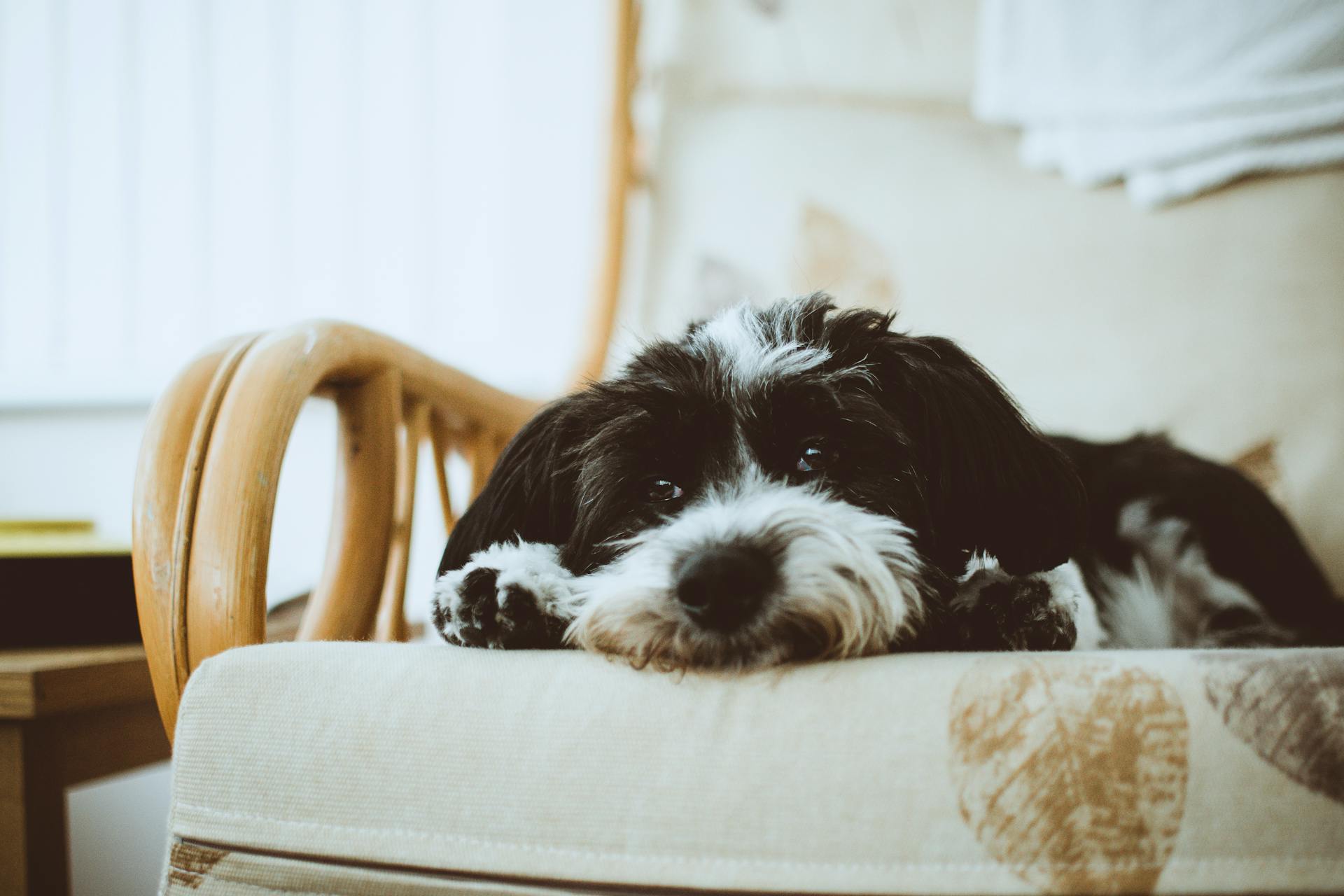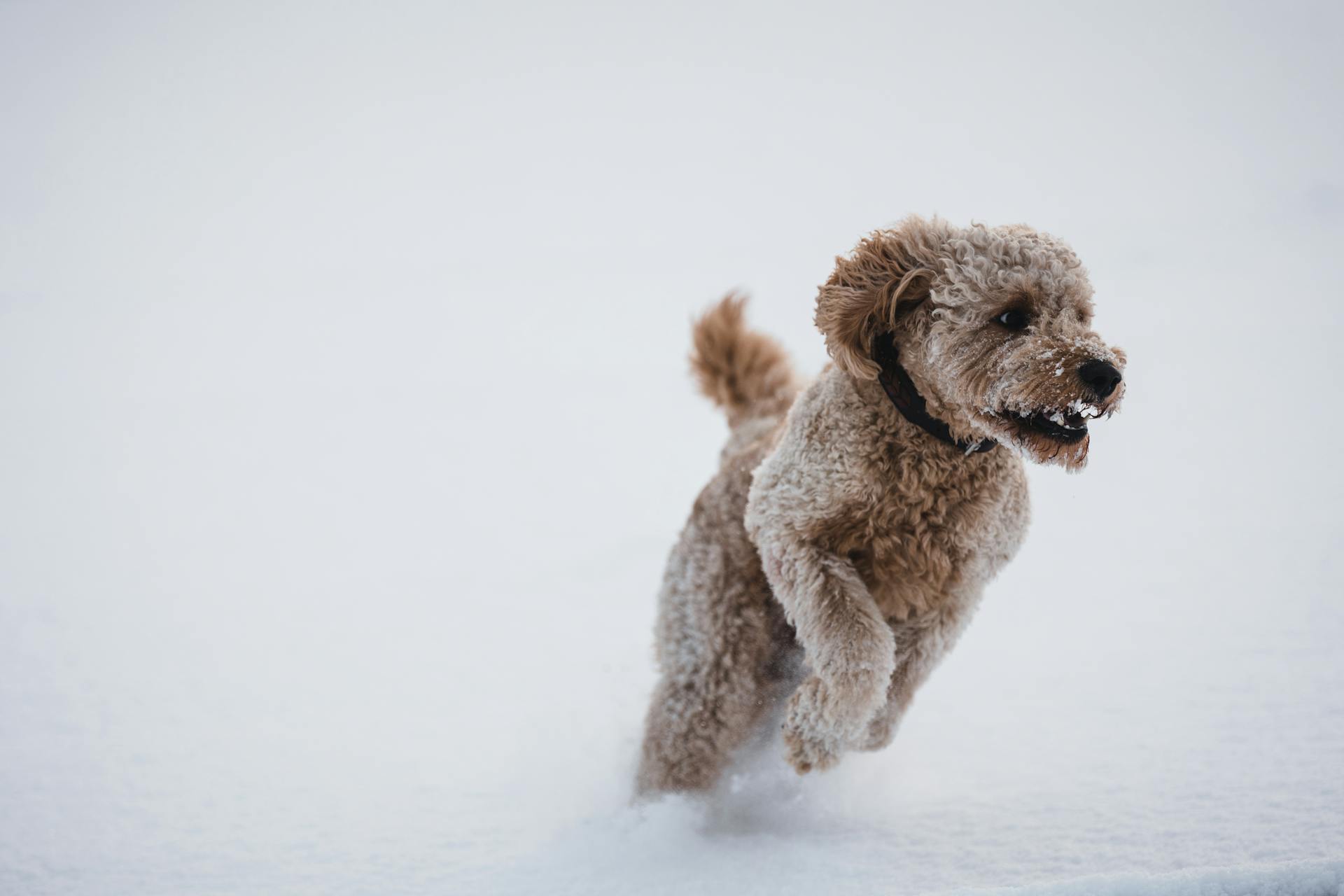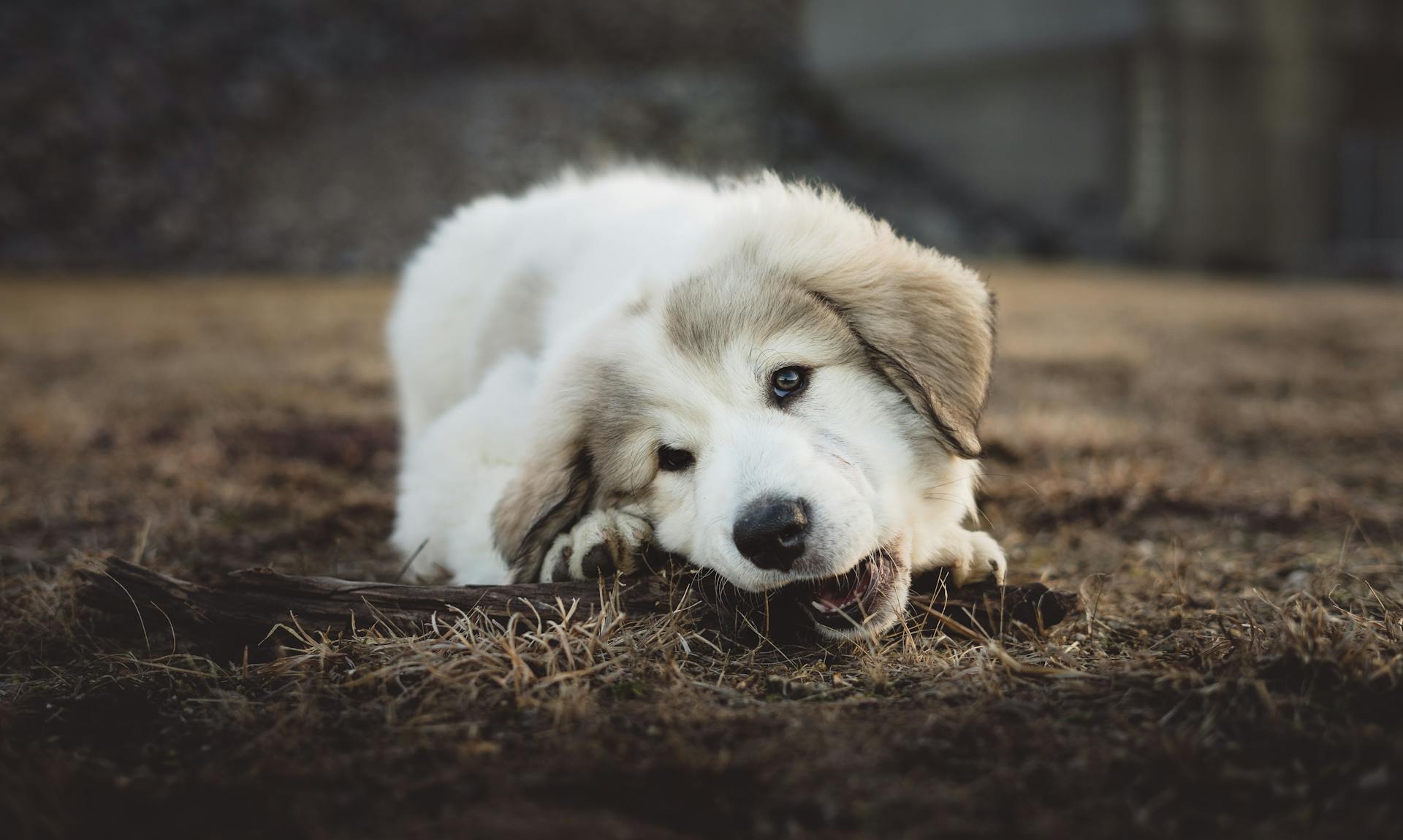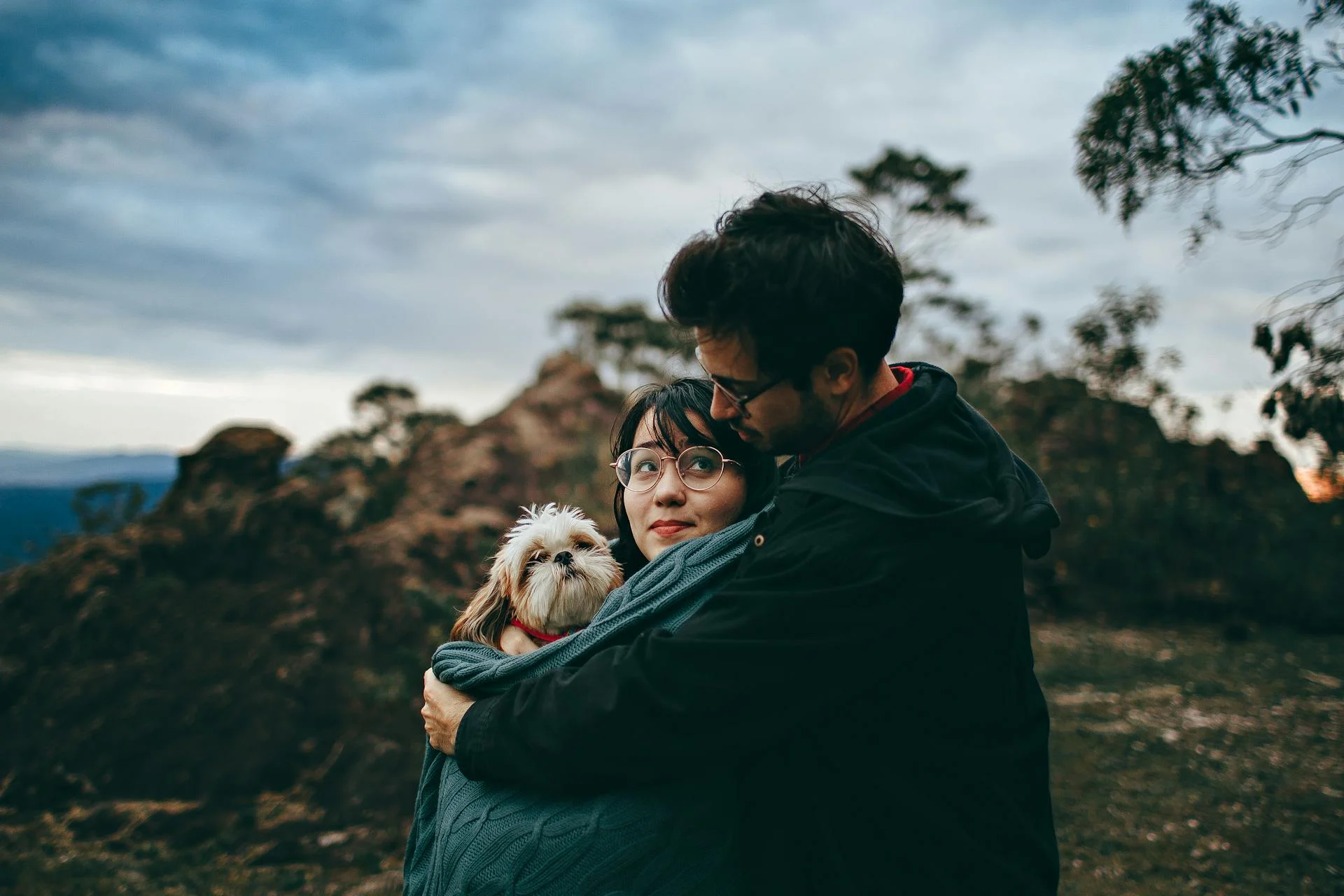
Potty training a Shih Tzu can be a challenging task, but with the right approach, you can overcome common problems and achieve success.
Shih Tzus are known to be sensitive and stubborn, which can make potty training a bit more difficult. They can be prone to accidents, especially if they're not taken out frequently enough.
Establishing a routine is key to successful potty training. Take your Shih Tzu out to the same spot each time to create a connection between the location and the action.
Consistency is crucial, so be sure to take your Shih Tzu out immediately after meals, naps, and playtime to prevent accidents.
Recommended read: Cavapoo Potty Training
Understanding Shih Tzu Behavior
Shih Tzus are notoriously difficult to house train, and it may take several weeks to several months to get them fully trained. This is due to their small size and independent nature.
Puppies display tell-tale signs that they are interested in eliminating, such as sniffing, circling, and squatting. These behaviors are crucial to recognize, as they indicate that your Shih Tzu needs to go outside.
Negative reinforcement, like yelling at your dog for having a potty accident, can result in even more accidents. Positive reinforcement, on the other hand, will encourage your puppy to learn the rules and let you know when they need to go outside for a pee or poop break.
Your Shih Tzu may show signs that they need to use the bathroom before they actually go. These signs include sniffing the floor, pacing in circles, and squatting. If you wait too long to take your dog outside, it could result in an accident inside the house.
Here are some common signs that your Shih Tzu needs a potty break:
- Suddenly stopping an activity
- Pacing or walking in circles
- Sniffing excessively
- Looking for somewhere more private
- Whining
- Sniffing or licking their groin area
- Pawing or jumping at the door
- Pawing at you or barking to get your attention
Observation is key to successful house training, and simply being around the puppy is not enough. You need to pick up on their body language and recognize the signs that indicate they need to go outside.
Potty Training Methods
The umbilical method is an effective way to keep a Shih Tzu puppy under observation, making it easy to tell if they need to eliminate.
You can attach one end of a leash to the puppy and the other to you, either to your belt or wrist, allowing you to have the puppy with you at all times.
This method requires that you be home with the puppy and able to pay a great deal of attention to their body language, such as whimpering or whining, which indicates they need to go outside.
See what others are reading: Shih Tzu Puppys
Indoors or Outdoors
Deciding where to take your puppy for bathroom breaks is a crucial step in potty training. Most people choose a location outside, but it's also possible to train your puppy to go on puppy pads or even use a dog litter box.
Puppy pads can be a game-changer for some dogs, especially those who don't like going out in the rain or extreme cold. Some Shih Tzus, for instance, might think they'll melt if they get wet.
If you want your puppy to eliminate in a specific part of the yard, it's essential to take them to that spot every time. Consistency is key, and staying with your puppy to praise them when they go will help them learn quickly.
Deciding on a mixed approach - taking your puppy outdoors sometimes and using puppy pads or a litter box at other times - can send confusing signals to your dog. This can make house training more challenging than it needs to be.
Related reading: Shih Tzu Dog Training
Umbilical Method
The Umbilical Method is a popular approach to potty training a puppy. This method involves keeping the puppy attached to you at all times using a leash, with one end attached to the puppy and the other to you.
You can attach the leash to your belt or wrist, making it easy to monitor the puppy's body language. The puppy will quickly learn to associate being near you with the opportunity to eliminate.
If the puppy starts to whimper or whine, showing signs of needing to eliminate, you immediately take them outside. Praise the puppy with a food treat, toy, or attention as soon as they eliminate outside.
They get the idea very quickly with this method, but it requires that you be home with the puppy and able to pay a great deal of attention to their body language.
Tips for Success
When supervising your Shih Tzu, look for signs that they need to go potty, such as sniffing excessively, pacing, or whining.
To prevent accidents, provide near-constant supervision and take your puppy outside frequently, especially after meals and playtime.
Use a crate to help with housetraining, but ensure it's large enough for your puppy to stand up, turn around, stretch out, and lie down.
To signal to your puppy that it's time to go potty, use phrases like "let's go potty" or "potty break", and praise them when they eliminate outside.
If you catch your puppy having an accident, startle them with a quick shout or clap and then hustle them outside to finish the job, praising them when they're done.
Here are some common signs that your puppy needs to go potty:
- Suddenly stopping an activity
- Pacing or walking in circles
- Sniffing excessively
- Looking for somewhere more private
- Whining
- Sniffing or licking their groin area
- Pawing or jumping at the door
- Pawing at you or barking to get your attention
Positive Crate Tips
Crates should be big enough for your Shih Tzu to stand up, turn around, lay down, and stretch out. This will prevent accidents and make the crate a comfortable space for your puppy.
To teach your puppy to enter the crate, toss a treat inside and praise them when they go after it. Decide on a specific word to use, such as "go to your crate" or "crate time", and repeat it along with your puppy's name.
Leave the crate door open when your puppy is playing to encourage them to go in and out freely. When you do close the door, give them another treat to associate the crate with positive reinforcement.
A crate can serve as a safe space for your puppy to sleep or get away from the commotion of a busy household. Most puppies feel very secure in their crate and will go in it whenever they want to sleep or relax.
To prevent accidents, never confine your puppy to their crate for extended periods of time. A young puppy can only go without eliminating for about 2 hours during the day, so be sure to take them outside regularly.
Here are some key features to consider when choosing a crate for your Shih Tzu:
- Crates should have ventilation on all four sides to keep your puppy cool and comfortable
- Crates should be big enough for your puppy to stand up, turn around, lay down, and stretch out
- Crates can be used as a "doghouse" or security den for a dog
- Crates can reduce anxiety and assist with separation anxiety when you're away from home
Tips for Success
Watch your puppy closely for signs that they need to go outside, such as sniffing around, circling, or arching their back. These signs are often subtle, but catching them early can prevent accidents.
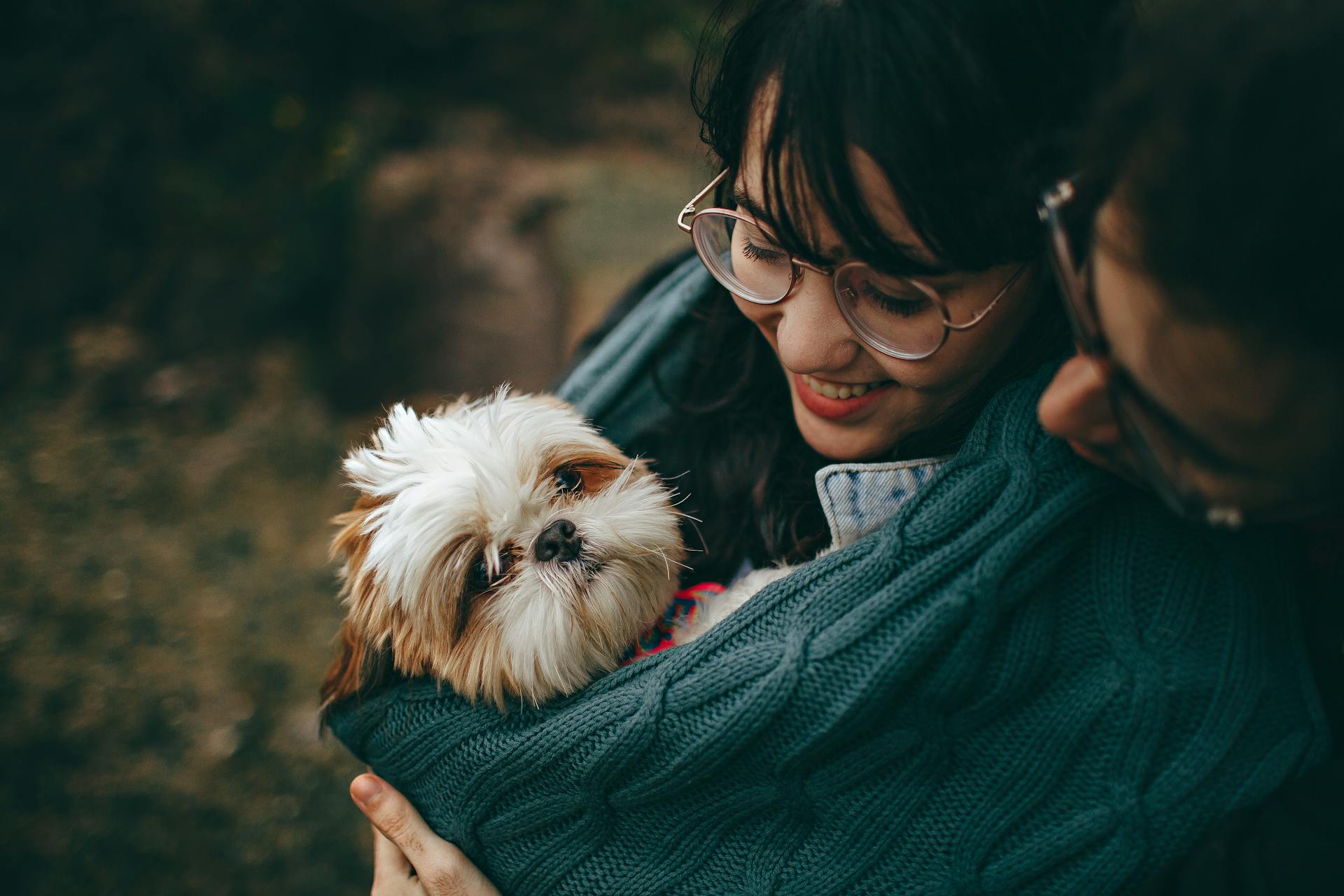
Use specific language to communicate with your puppy, such as "Abby, go pee pee" or "let's go potty." This will help them associate certain words with the action of going outside.
Praise your puppy and give them treats when they do what you want, like going outside to pee or poop. Positive reinforcement is key to successful housetraining.
If your puppy doesn't go outside after 10 minutes, take them inside and put them in a crate for 15 minutes. Then, take them back outside and repeat the process. Consistency is crucial when housetraining.
Use a leash when taking your puppy outside to potty, so they learn to eliminate while walking. This will make future outings easier and less messy.
Take your puppy on outings and praise them when they eliminate, even if it's not in your yard. This will help them understand that going potty is a normal part of life.
Here are some common signs that your puppy needs to go outside:
- Sniffing the floor
- Pacing in circles
- Squatting
- Sniffing or licking their groin area
- Whining
- Pawing or jumping at the door
- Pawing at you or barking to get your attention
These signs are often indicative of a puppy who needs to go outside, so be sure to catch them early and take them out to potty.
Common Issues
Shih Tzu potty training problems can be frustrating, but understanding the common issues can help you tackle them head-on.
House soiling is a common issue in Shih Tzus, with some owners reporting that their dogs will urinate or defecate in the house even after being taken outside.
Lack of consistency in training can lead to confusion in the dog, making it harder to establish good potty habits.
Shih Tzus have small bladders, which can lead to frequent potty breaks and accidents if not managed properly.
Accidents can also be caused by medical issues such as urinary tract infections or kidney stones, which can be painful for the dog and require immediate veterinary attention.
A unique perspective: How to Train Maltese Puppies Potty Training
Submissive Urination
Submissive Urination is a common issue in dogs, where they crouch and urinate when meeting people. This is a normal canine gesture of submission.
Most puppies outgrow this habit, but some do not. Scolding or punishing a dog displaying submissive urination will actually cause the dog to urinate more.
For more insights, see: Definition of Shih Tzu
Greeting your dog outside is a great way to avoid this issue. Walking away from the puppy when you're greeting him can also help.
Waiting until he calms down before petting him is crucial. This will help him feel more comfortable and secure.
When petting your dog, try petting him on his chest or under his chin, not on his head. Standing over him when you pet him can be overwhelming, so try crouching down or standing to the side instead.
Here are some tips to help you manage submissive urination:
- Greet your dog outside
- Walk away from the puppy when you are greeting him
- Wait until he calms down before petting him
- Pet him on his chest or under his chin, not on his head
- Don't stand over him when you pet him, crouch down or stand to the side
Excitement Urination
Excitement Urination is a common issue in puppies, often triggered by seeing their loved ones, and can even occur in older dogs who haven't mastered control of their sphincter muscles.
This behavior is usually most frequent when an owner returns home from work, making it essential to keep homecomings low-keyed to give the puppy a chance to greet them calmly.
Both excitement and submissive urination seem similar, but they represent distinct issues.
Time is a great healer, and excitement urination often tends to eliminate itself as the puppy matures.
You can take steps to deal with excitement urination while allowing your puppy to grow and develop normally.
Marking
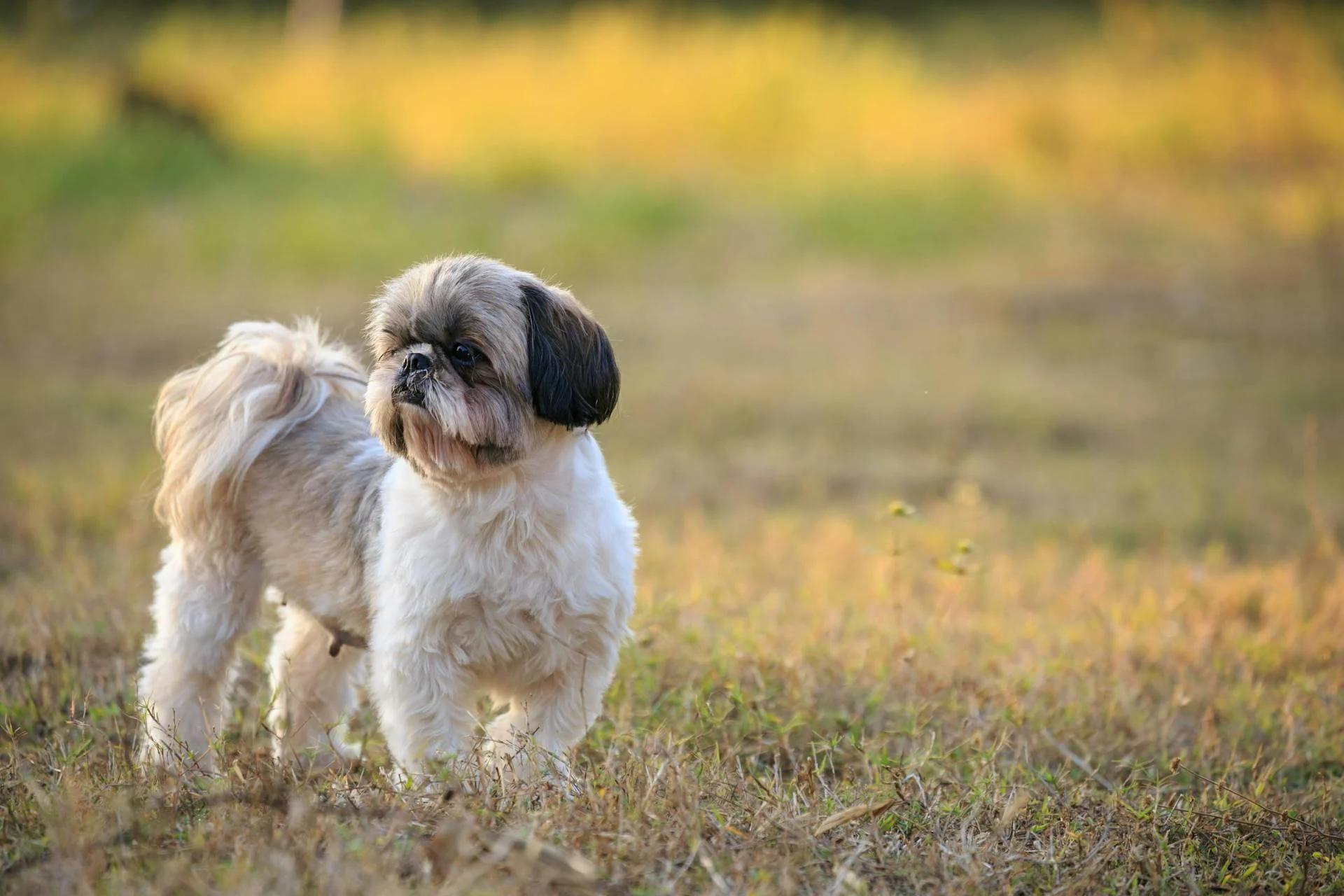
Marking is a common issue many dog owners face. Scolding or punishing your dog won't work to stop marking.
High-ranking dogs are more likely to mark, and unaltered adults will mark more than neutered or spayed dogs. This means if you have a dominant dog in the household, you can expect more marking.
Unaltered females will mark just as much or more than neutered males, especially if there are other dogs in the household. Clean up is essential, and preventing your dog from their favorite areas can help.
Females often squat as if to urinate but instead mark with just a small amount of urine. Taking your dog outdoors for more opportunities to mark can help, especially if they're willing to mark their territory outside.
Belly bands for male dogs and doggie diapers for females can be a lifesaver for saving furniture and carpet. Crating can also help, but it's unfair to keep a dog crated all the time.
Health Problems
Health problems can be a major obstacle in the potty training process for your Shih Tzu. Many health issues can result in dogs peeing or pooping more than usual, making housetraining next to impossible. It’s not uncommon for a urinary tract infection or some other ailment to make housetraining next to impossible. Keep up with regular vet visits to detect any health concerns early.
Urinary or bladder infections can occur in young puppies, and if you're having an unusually difficult time with housebreaking, it's worth checking with your veterinarian. If your puppy is urinating in the house, it could be bladder inflammation, a urinary tract infection, bladder or kidney stone, liver disease, patent urachus, or an ectopic ureter. If the problem is poop, it could be intestinal parasites, an inflamed digestive system from too-rich foods, being fed too much, or a deficiency in pancreatic enzymes.
Medical problems can be easy to overlook, but they're a common cause of potty training problems. If your pup is only having pee accidents, is peeing with extreme frequency, and/or you see a drastic change in your dog's bathroom habits, your first visit should be to your veterinarian to check for any underlying medical issues.
Frequently Asked Questions
How long does it take to potty train a Shih Tzu?
Housebreaking a Shih Tzu typically takes 2 to 4 months with consistent daily effort. Puppies as young as 8 weeks old can start learning to go potty outside.
How often does a Shih Tzu need to pee?
Shih Tzus typically need to go outside every 4-6 hours during the day, with younger dogs requiring more frequent breaks. As they mature, they can hold their bladder for longer periods, up to 6-8 hours
Can you train a Shih Tzu to use a litter box?
Yes, Shih Tzus can be trained to use a litter box, especially when started early in life
Sources
- https://www.miracleshihtzu.com/house-train-a-shih-tzu.html
- https://www.k-9.com/blog/solving-puppy-potty-training-problems/
- https://peachonaleash.com/solving-puppy-potty-training-problems/
- https://dogtime.com/reference/dog-training/362-housetraining-for-puppies
- https://www.dogster.com/dog-training/how-to-potty-train-a-shih-tzu
Featured Images: pexels.com
